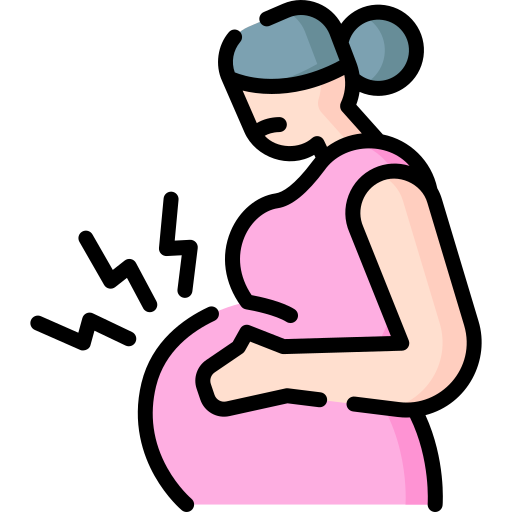Tools
 Medical calculators
Medical calculators
 Obstetrics & Gynaecology
Obstetrics & Gynaecology
Pregnancy Due Date Calculator
Pregnancy Due Date Calculator

A Pregnancy Due Date Calculator is a handy tool that helps expectant parents estimate the approximate date when their baby is likely to be born.
It takes into account the first day of the mother's last menstrual period and provides an estimated due date based on the average length of pregnancy, which is typically around 40 weeks or 280 days.
By inputting the date of the last menstrual period into the calculator, it calculates the number of weeks that have passed since conception. The calculator then adds this duration to the start date to determine the estimated due date.
It's important to note that the Pregnancy Due Date Calculator provides an estimate and is not an exact prediction.
While the Pregnancy Due Date Calculator provides a helpful estimate, it's essential to remember that every pregnancy is unique, and the actual birth date may vary. Factors such as the mother's menstrual cycle irregularities, variations in fetal development, and individual differences can influence the actual delivery date.
The Pregnancy Due Date Calculator serves as a useful resource for expectant parents to track their pregnancy progress and plan accordingly. Knowing the estimated due date can help parents prepare for the arrival of their baby, including making arrangements for prenatal care, organizing baby essentials, and creating a birth plan.
However, it's crucial to consult with healthcare professionals, such as obstetricians or midwives, for accurate and personalized information regarding pregnancy and delivery. They can provide comprehensive guidance, monitor the progress of the pregnancy, and address any concerns or complications that may arise.
In summary, a Pregnancy Due Date Calculator is a valuable tool that provides an estimated date for the arrival of a baby based on the mother's last menstrual period. While it offers a helpful estimate, it's important to consult healthcare professionals for personalized care and guidance throughout the pregnancy journey.

Last update: 08 Jun 2023 23:23
 General info and warning signs during a pregnancy
General info and warning signs during a pregnancy

A normal pregnancy typically lasts around 40 weeks, which is calculated from the first day of the last menstrual period. However, it's important to note that the actual duration of pregnancy can vary between individuals.
During a normal pregnancy, several factors are closely monitored by healthcare professionals. These include:
- Fetal Development: The growth and development of the fetus are tracked throughout the pregnancy. Ultrasounds and other diagnostic tests are used to ensure that the baby is developing appropriately.
- Maternal Health: The mother's health is continuously assessed, including monitoring blood pressure, weight gain, and any signs of gestational diabetes or preeclampsia.
- Blood Tests: Various blood tests are conducted to check for factors such as blood type, Rh factor, anemia, and infections. These tests help identify any potential risks or complications.
- Nutritional Status: A balanced and nutritious diet is important during pregnancy. Healthcare providers may advise on proper nutrition, vitamin and mineral supplements, and weight management.
- Hormonal Changes: Pregnancy triggers significant hormonal changes in the body. These changes can have various effects, such as increased blood volume, changes in skin pigmentation, and emotional fluctuations.
While every pregnancy is unique, it's crucial to be aware of potential warning signs or complications that may arise. Some common warning signs that require immediate medical attention include:
- Vaginal bleeding or spotting
- Severe abdominal pain or cramping
- Sudden swelling of the hands, face, or feet
- Severe headaches or visual disturbances
- Decreased fetal movement
- Persistent nausea and vomiting
- Signs of preterm labor, such as regular contractions before 37 weeks
If any of these warning signs or other concerning symptoms occur, it is essential to seek medical assistance promptly.
In summary, a normal pregnancy lasts around 40 weeks and involves regular monitoring of fetal development, maternal health, blood tests, and nutrition. It is important to be aware of warning signs or complications that may arise during pregnancy and seek immediate medical attention if needed. Regular prenatal care and open communication with healthcare professionals are key to ensuring a healthy pregnancy and delivery.
 Studies on late pregnancies
Studies on late pregnancies

A couple of studies have research the subject of late pregnancies and came to the following conclusions:
- A study on 656,423 has shown that male gender increases the likelihood of prolonged pregnancy beyond term.
At 41, 42, and 43 weeks of gestation, the odds ratios for delivering a male fetus were 1.14, 1.39, and 1.50, respectively and among all these 656,423 deliveries, there were three male deliveries for every two female deliveries by 43 weeks of gestation[1].
- A study on 731 women at 37-41 weeks of pregnancy showed that a cervical length shorter than 10 mm indicates an 86% chance of delivery within seven days. When performing a vaginal ultrasound, a cervical length of 30 mm suggested a less than 50% chance of delivery within seven days.
Estimating gestational age and due date using the last menstrual period and ultrasound examinations had a low accuracy rate, with only 5% of women delivering on the predicted date. The weakness of the study was that it had gathered limited information for predicting delivery timing for women at term (around 38-39 weeks)[2].
- Another study on 120 women (of which 109 were selected because the pregnancy resulted in a live birth), suggested that regular BMI testing throughout the pregnancy would be a useful tool in determining average progression of gestation and approximating the gestation age. Still, the validity and accuracy of the results were dependent on gathering correct weight data points immediately before or after the last recorded menstruation, either by the patient or the gynaecologist[3].
- The study also notes the fact that pregnancy-related events could be discovered early by measuring weight data, but self reporting of this data may lead to inaccurate results.
References
Custom citation style optimized for readability:
Title -> Authors -> Source -> Date
Lesson authors: Dr. Mironescu Olivier, Dr. Huțuleac Oana-Mihaela
Published on: 08 Jun 2023 23:23
success24
A Pregnancy Due Date Calculator is a handy tool that helps expectant parents estimate the approximate date when their baby is likely to be born.
It takes into account the first day of the mother's last menstrual period and provides an estimated due date based on the average length of pregnancy, which is typically around 40 weeks or 280 days.
By inputting the date of the last menstrual period into the calculator, it calculates the number of weeks that have passed since conception. The calculator then adds this duration to the start date to determine the estimated due date.
It's important to note that the Pregnancy Due Date Calculator provides an estimate and is not an exact prediction.
While the Pregnancy Due Date Calculator provides a helpful estimate, it's essential to remember that every pregnancy is unique, and the actual birth date may vary. Factors such as the mother's menstrual cycle irregularities, variations in fetal development, and individual differences can influence the actual delivery date.
The Pregnancy Due Date Calculator serves as a useful resource for expectant parents to track their pregnancy progress and plan accordingly. Knowing the estimated due date can help parents prepare for the arrival of their baby, including making arrangements for prenatal care, organizing baby essentials, and creating a birth plan.
However, it's crucial to consult with healthcare professionals, such as obstetricians or midwives, for accurate and personalized information regarding pregnancy and delivery. They can provide comprehensive guidance, monitor the progress of the pregnancy, and address any concerns or complications that may arise.
In summary, a Pregnancy Due Date Calculator is a valuable tool that provides an estimated date for the arrival of a baby based on the mother's last menstrual period. While it offers a helpful estimate, it's important to consult healthcare professionals for personalized care and guidance throughout the pregnancy journey.
Pregnancy Due Date Calculator, Estimated Due Date, Pregnancy Tracker, Gestational Age Calculator, Conception Date Calculator, Menstrual Cycle, Prenatal Care, Baby Arrival Date, Pregnancy Progress, Birth Plan, Obstetrician, Midwife, Fetal Development, Pregnancy App, Baby Essentials, Pregnancy JourneyPregnancy Due Date CalculatorPregnancy Due Date Calculator0000